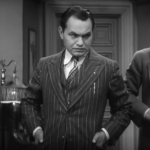 |
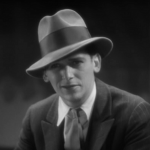 |
 |
| Rico Edward G. Robinson |
Joe Douglas Fairbanks Jr. |
Olga Glenda Farrell |
| Released by Warner Brothers | Directed By Mervyn LeRoy |
||
Proof That It’s Pre-Code
- Homosexual undertones galore. From a few guys checking out Douglas Fairbanks Jr.’s dance moves to Rico’s gushing toady, it’s hard not to read the whole thing as the story of a deeply closeted man working out his sexual frustrations on the whole of the civilized world.
- A surprising amount of onscreen violence, including muzzle flashes and a few men shot dead.
- “Tell them they can go to–“
Little Caesar: Dueling Pistols
“We gotta stick together. There’s a rope around my neck now and they only hang you once. If anyone gets yellow and squeals, my gun is gonna speak its peace.”
During my many adventures in reading about movies (an irony that never fails to amuse me), one book I came upon was The Studio by John Gregory Dunne. It’s about the trials and tribulations of 20th Century Fox for a year of its existence– 1967– and how the studio desperately tried to rework its business model to survive. One thing they tried was to revive the studio acting pool, grooming pretty looking young men and women for leading roles in their productions.
The plot failed, of course, not the least of which was one executive’s observation that you can’t make a person who was simply conventionally beautiful a star. Stars need personality more than looks, with the book using Steve McQueen as an example.
I was reminded of that when watching Little Caesar because you definitely can’t build a star like Edward G. Robinson. A Jewish-Romanian who’d studied to be a Rabbi before trying law school and eventually working his way to the theater, Robinson worked on Broadway for fifteen years and made his first appearance in a silent film in 1923. But when the talkies came, so came Robinson’s voice to the masses– a distinctly New York-ian snappy piece of work, a raspy growl that signifies a great deal of soon-to-come fury.
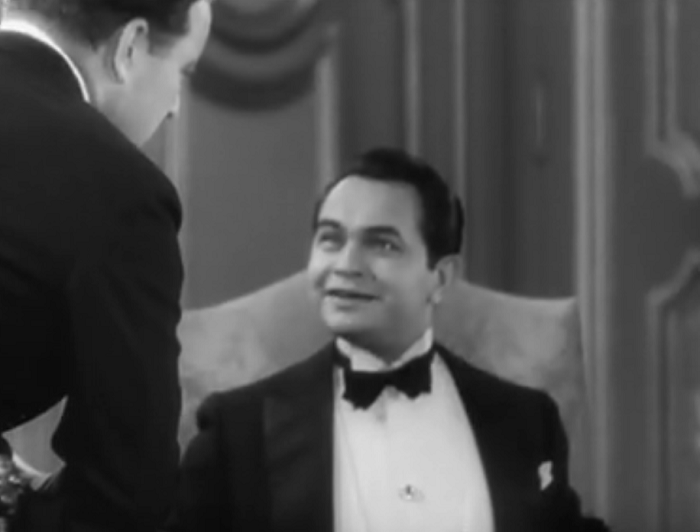
Sure, it’s all big smiles until the pistols come out.
Little Caesar is the movie that made Robinson a star, a role that allows him to embody a character of unstoppable, aggressive malice. His character of Rico, AKA Little Caesar, is a bully in search of the American dream, all too eager to find the next guy to squeeze it out of. He’s not just a thug– he’s charismatic and clever. And, most importantly, he’s ruthless.
Charting Rico’s meteoric rise and fall, Little Caesar is an early talkie that shows what ambition can get you and how one act of kindness can doom you. Rico’s big stumbling block is his longtime pal Joe (Fairbanks Jr), a good looking dancer who wants to go honest after the two perform a series of low-level robberies. Rico resists, telling Joe that they’re together for life and takes him with him to Chicago– the big leagues of crime.
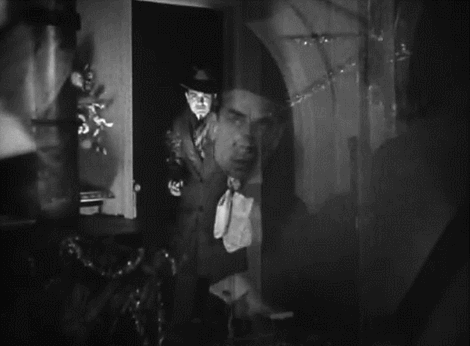 Rico starts working with a gang and quickly begins swaying them to his belief in the power of a loaded pistol over the gang’s preferred method of running and hiding. Elsewhere, Joe meets Olga, a lovely blonde dancer who objects to the gun he keeps under his arm. Where Joe’s mild ambitions are further curbed by a good honest love, Rico’s are encouraged by his gang’s fawning. After a successful holdup of a nightclub that sees Rico kill the city’s crime commissioner, all pretense is dropped. Rico is the boss now.
Rico starts working with a gang and quickly begins swaying them to his belief in the power of a loaded pistol over the gang’s preferred method of running and hiding. Elsewhere, Joe meets Olga, a lovely blonde dancer who objects to the gun he keeps under his arm. Where Joe’s mild ambitions are further curbed by a good honest love, Rico’s are encouraged by his gang’s fawning. After a successful holdup of a nightclub that sees Rico kill the city’s crime commissioner, all pretense is dropped. Rico is the boss now.
A note about the robbery: Director Mervyn LeRoy (the master behind quite a few memorable pre-Codes including Five Star Final, I Am a Fugitive From a Chain Gang and Gold Diggers of 1933) films the robbery in a long series of fades, creating ellipses around the action. It makes the tension around the event hazy and dreamlike, and the violence, though not bloody, still sticks out like a nasty little punctuation mark.
The murder of the commissioner becomes the key to both Rico’s downfall and success. It’s brazen enough to gain him notoriety, but it leaves a few witnesses. When Tony, the gang’s driver, threatens to go to the police to clear his conscious, he’s gunned down on the station’s steps.
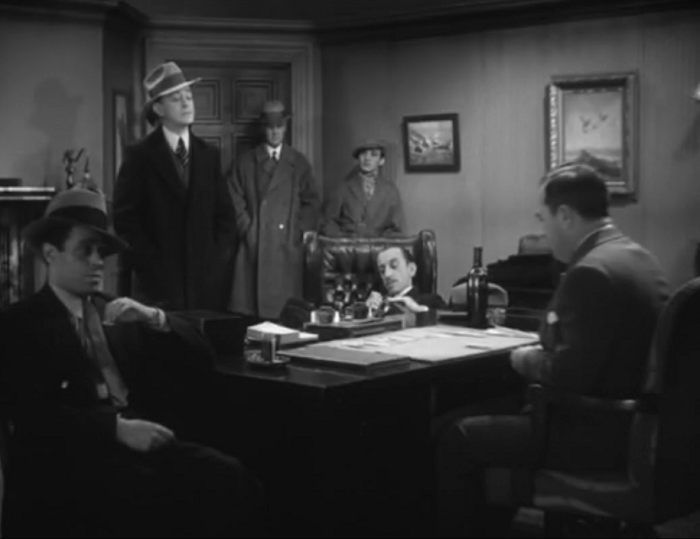
A good old time in old gangland.
Tony’s death is one of the more interesting passages in the film. We follow a few gangsters in the funeral procession who muse on death and then wonder how the mortician can make a man who met a violent end look so good. But the key moment is when they talk about Rico’s wreath that he had sent. Rico, the man who ordered Tony’s death, sends the biggest and grandest wreath of them all inscribed with just one word: Tony. For a man shown to be as caustic and egomaniacal as Rico, this is a nice moment of humanization: though he likes killing, he understands the consequences and repercussions of it. It’s a smart move for his gang, too, reinforcing a sense of family and loyalty– even if they’re forced to murder one another.
Rico’s success soon endears and scares others in the criminal underworld. He has a gala thrown in his honor, attended by gangsters of every stripe who seem to resemble monkeys in suits. There’s an old episode of “Star Trek” that noted it’s easier for civilized men to behave barbarically than for barbaric men to act civilized, and that encapsulates this scene in a nutshell. No matter how much class and money Rico and his cohorts dress themselves in, they look silly. We can enjoy their vicarious flaunting of the law, but they remain a curiosity to be lampooned.
Speaking of lampooning, we also get one of Caesar‘s silliest scenes during this stretch where Rico, known to be muscling in on other mobster’s territory, is the victim of an attempted drive-by. Rico is winged, but manages to immediately turn around and yell at the hitmen, “Fine shot you are!” Then the police officer who has been hounding him about the commissioner’s death shows up at the scene of the shooting and the two snap at one another. For Rico, the bullet hardly registers– it’s the sting of the police officer’s putdowns that rile up his ego.
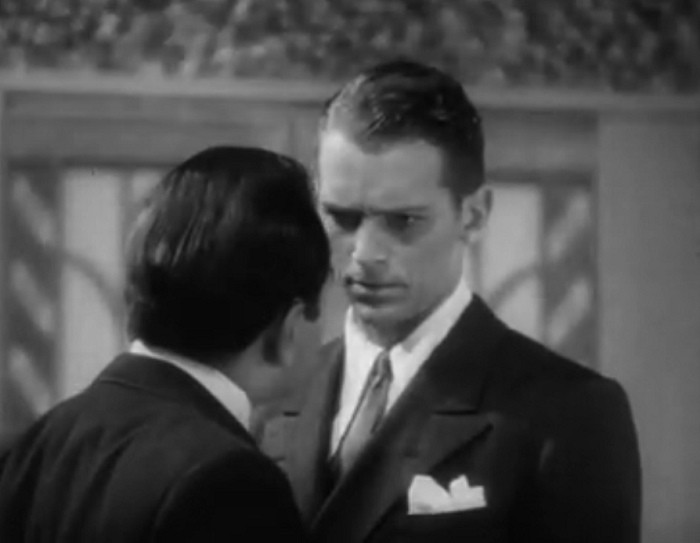
Let’s… make love?
Rico’s ego ties into his downfall as he again turns to the domesticated Joe and offers him a leadership position in his growing Chicago criminal empire. Joe hasn’t been a faithful companion for quite some time, and Rico’s constant prodding and pursuit seem to indicate an affection there that’s something more than just friendship or even trying to cover up his tracks. But that may be one of the more infamous aspects of the movie.
Spoilers.
The most often talked about piece of Little Caesar, save for Robinson’s performance and the obvious influence on murderous anti-heroes on every film since, comes from the film’s subtext which presupposes Rico’s friendship with Joe as more than just friendly. It’s not difficult to read into, either, since the movie from the start gives you these two very different men and absolutely no reason a friendship should exist between them. Rico is grubby, Joe is fancy. But there’s always a desire in Rico, an urge to make Joe into his idea of the perfect man– strong, powerful, and, of course, right at Rico’s side.
Getting to Chicago sees the two split up and Joe dives eagerly into a heteronormative relationship with Olga. “Dancin’? Women? Where do they get you?” Rico sneers. Unlike a lot of homosexual characters, Rico’s not effeminate in the least. In fact, he’s dangerously virile, with his domination of the mob turning them from wise hitmen to slavish devotees. The most notable of Rico’s new underlings is Otero (George E. Stone), a fawning stoolie whose flattery towards Rico certainly seems to say that even if Joe says no, Otero may be happy to say yes.
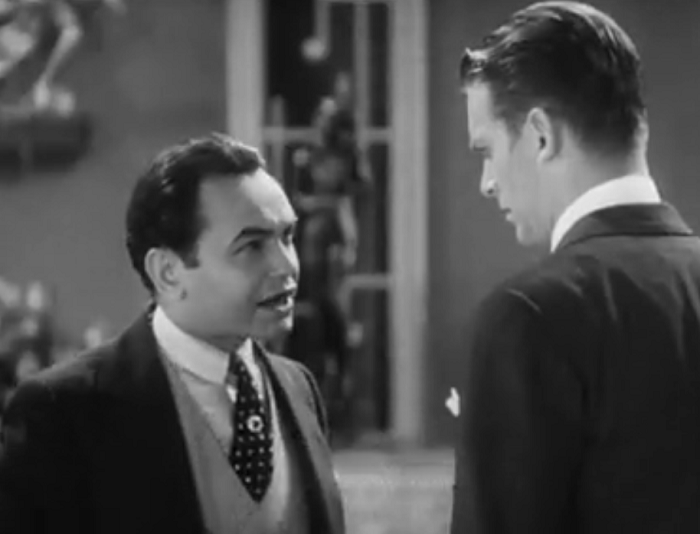
“Can’t you see what I’m trying to tell you, I’m… uh… deeply repressed.”
When other reviewers talk about the homosexual undertones, they often point out that Rico has no romantic attachments to any woman throughout the picture. In fact the only women Rico spends any time around he threatens to murder. This makes Olga in the lynchpin in Rico’s downfall; after Joe hears that he’s going to gun for the both of him, he wants to run. Olga is the one with chutzpah (or, you know, balls) in the relationship, and her decision to call the police is what sets off the final confrontation between Rico and Joe. As Fernando Croce puts it so well:
“This game ain’t for sissies,” Robinson’s Napoleonic capo grumbles, yet when it’s time to off his best pal, he approaches with erect pistol and retreats with watery eyes.
Failing to seize the moment and end the threat of Joe turning in evidence on him, Rico’s fall from grace is swift and brutal. A man with thousands, with gorgeous clothes and a posse of loyal men ends up in a flop house, unshaven and ruined. We never learn what happened to Joe, but we can only imagine Olga further pushing him to her way him while Rico rots away both physically and mentally. Rico is easily goaded by the police to show himself and when he does, he is gunned down with the air of smug pleasure by the ever patient and waiting police.
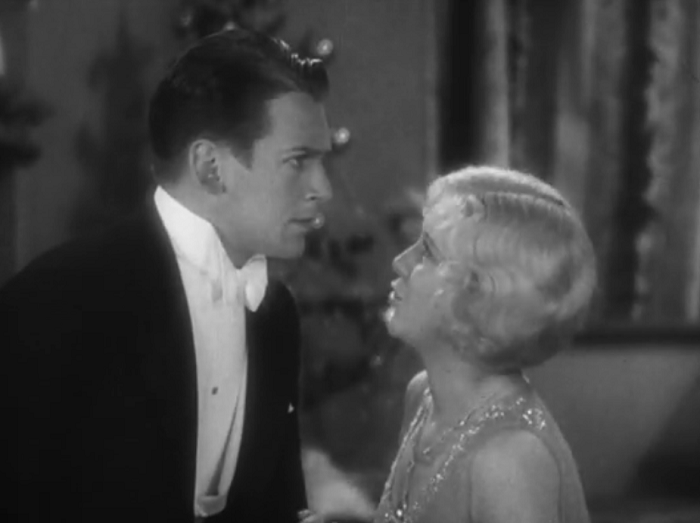
A woman named Olga is the hero of the movie.
The moral of Little Caesar isn’t so much about coming out of the closet or even that Rico’s moment of weakness in choosing not to murder Joe was his redeeming character trait. In fact, it sure seems that the lesson of Little Caesar is that to be successful, you have to be emotionally hard. To remove nostalgia and love from yourself and you’ll find success, especially if it’s tied up in an impure kind of love. The moral is unsentimental, but an uncanny reflection of the times.
There’s also the distinct undercurrent of how appealing violence is to the downtrodden. When Rico first meets Sam’s gang, they’re crooks, sure, but pacifist ones, happy to just rob and escape. Rico’s desire to inflict violence empowers his gang, and they rally around his push to do more than just run from the cops. The gang grows and thrives because of this; power comes from the end of the gun barrel, but it doesn’t just kill. It inspires. Again, at the tale end of Prohibition and a decade of gang warfare, an unsurprising sentiment.
End spoilers.
Little Caesar can be bit stodgy to modern viewers. While that can be blamed on it being a fairly early talkie– coming only a few years after the release of The Jazz Singer and even featuring a few outdated title cards– I think the boredom some feel is just that the movie is simply a familiar tale. Generations of Scorseses and Coppolas have mimicked Little Caesar in bigger and louder films, and the relatively bare bones approach that Little Caesar offers doesn’t give a lot of leeway. Some of the acting, too, is pretty wooden– Fairbanks Jr. is practically translucent in a role that the audience has to spend the most time reading into, while Farrell is certainly a ways away from her snappier, more independent personality that would make her a solo star in a few years. The police here, like in Doorway to Hell, spend most of the time simply sleepily glowering, which doesn’t add a lot of excitement to that end of the proceedings.
It also doesn’t help that while many of the cliches from The Public Enemy and Scarface have gotten a beating from pop culture, Edward G. Robinson’s guttural, squinty performance has become a touchstone. Rico has been everywhere since he arrived. One only imagines what Robinson would have gotten in royalties from all of the times he was spoofed by the Looney Tunes alone. Hell, you haven’t seen any pizza chains named after The Public Enemy floating around, have you?
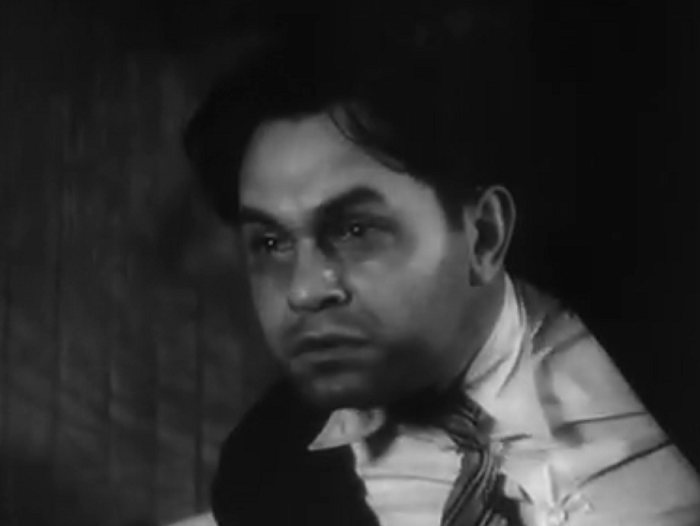
Pizza pizza.
By 1933, Prohibition was over, enforcement of the Motion Picture Production Code was looking like a foregone conclusion, and the first cycle of gangster movies– including Doorway to Hell, Little Caesar, The Public Enemy, Smart Money, The Hatchet Man, Scarface, The Beast of the City, The Secret Six, and plenty more– had come to an end. With the enforcement of the Code, Cagney and Robinson became government agents or comedic takes on their famous mobsters. When either returned to the serious gangster movie, their deaths were no longer noble or sympathetic. For much of the next 30 years, the bad guys were just that: bad guys.
Robinson would transition from Caesar to more gangster roles, both serious and comic. His serious ones rarely ever contained the same menace as Caesar, if only because the thought of even trying to top his iconic performance was probably doomed from the get go. He had many great movies left in him of course– Double Indemnity, Key Largo, some even covered on this blog, believe it or not– but Rico is and was hard to top.
Gallery
Hover over for controls.
Trivia & Links
- Casting stuff: Robinson originally auditioned for the role of Ostero before he was cast as the lead. Fairbanks’ role as Joe was apparently originally considered for Clark Gable, but Warner Brothers didn’t see the potential in him and his big ears. Also notable: the character of Joe was reportedly based on real life dancer, gangster consort, and future Hollywood star George Raft.
- Greg Klymkiw’s Film Corner does a great job defining what’s so remarkable about Robinson’s performance:
As Rico, Robinson creates a character who is vile, cretinous, borderline psychotic and yet, from beginning to end we’re with him. The script provides no literal obvious backstory for his ruthless ambition and the way he plays the role, we don’t need it. Robinson fills in the blanks perfectly.
In one scene, when Rico is confronted by his pal Joe who desperately pleads to “get out” of this life of crime, LeRoy wisely and brilliantly keeps the camera over Joe’s shoulder during his lengthy monologue and trained squarely on Rico. Robinson’s look of vile ambition, utter disgust and pitiful envy over the fact that his friend has found love and purpose is skin-crawling. And all the while, we simply can’t take our eyes off him.
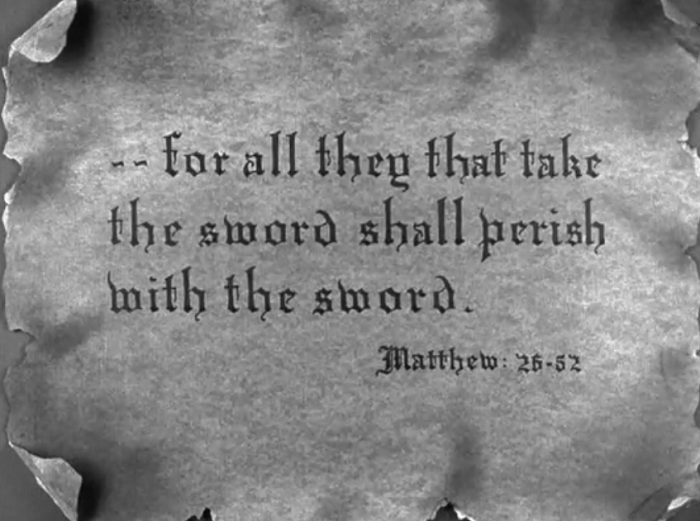
The film’s prologue that offers the cleanest bit of moralizing the film has to offer.
- Blu-ray.com talks about the film’s release on the format and gives the video and extras a decent enough rating. I do like this observation:
Little Caesar drew the broad outlines of the gangster film that later masters like Francis Coppola and Martin Scorsese have since painted with ever more detail. Watch Little Caesar, and you can easily spot the progenitors of the famous shot in Goodfellas where Scorsese introduces the rogues gallery of gang members with his roving camera, or how Coppola stages a climactic execution on the courthouse steps in the first Godfather. Like the criminal organizations they depict, gangster films have a strong sense of tradition.
- AMC Movie Site has a full rundown of the film blow by blow including quotes.
- An excerpted mini-site for The Ultimate Book of Gangster Movies has plenty of tips and trivia on the film. Besides calling out Rico for eating spaghetti the wrong way, they explain the film’s last line– and why it was changed from the book:
“Mother of mercy, is this the end of Rico?” Robinson’s last line in the film is one of the most quoted in the gangster genre. Ironically, the original line, in both the screenplay and the novel on which it was based, is: “Mother of God, is this the end of Rico?” Hollywood, ever conscious of the censors, opted to go with what was considered the less offensive line. Such thinking is hard to imagine today when, among other things, some movie websites track the number of “fucks” uttered in contemporary gangster films. (There were, for example, over 200 in Al Pacino’s Scarface.)
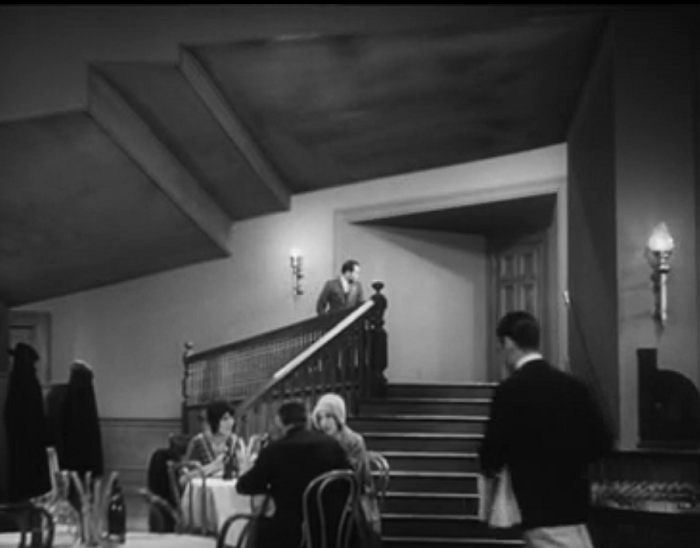
LeRoy’s direction can be hit or miss, but, but not being afraid of long shots as well as the intimate, his movie definitely looks dynamic.
- I talked a bit about the cycle of gangster movies and how the Production Code changed the anti-heroes to heroes, at least for a time. I thought this observation from The A.V. Club, reviewing the Warner’s Gangster Collection, about 1948’s White Heat serves as a nice footnote to Warner’s golden era of crime films started by Little Caesar:
After four versions of a single story, White Heat serves as a “10 years later” epilogue. The ’30s gangster pictures were stylish and set-bound, with snappy visual storytelling derived from silent-movie grammar. White Heat is more in the vein of film noir and documentary realism, as it takes to the streets of Los Angeles and the outlying California farms. The darkly funny banter remains, continuing the tradition that bridges Little Caesar and The Sopranos, but though Cagney still personifies underworld cool, with a gun in one hand and a chicken leg in the other, he’s also become a little pathetic. The man on the rise has become a man out of time, his ambition accompanied by blinding headaches and a Freudian mother fixation. If the Warner Gangsters Collection traces America’s perception of its place in the world, from Prohibition to the end of World War II, then White Heat completes the thought with a nuclear-era exclamation point, as Cagney shouts, “Made it, ma! Top of the world!” before the refinery he’s standing on explodes into a mushroom cloud.
- Here’s the movie’s original trailer:
Awards, Accolades & Availability
- Nominated for Best Adapted Screenplay.
Comment below or join our email subscription list on the sidebar! |
||
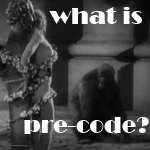 |
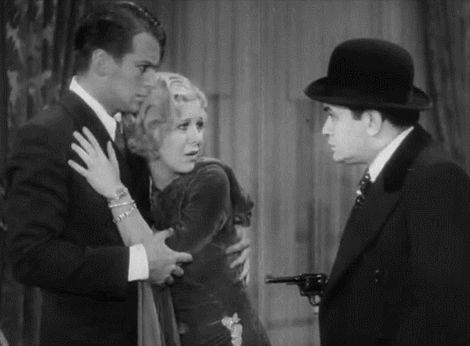 |
 |
 |
 |
|
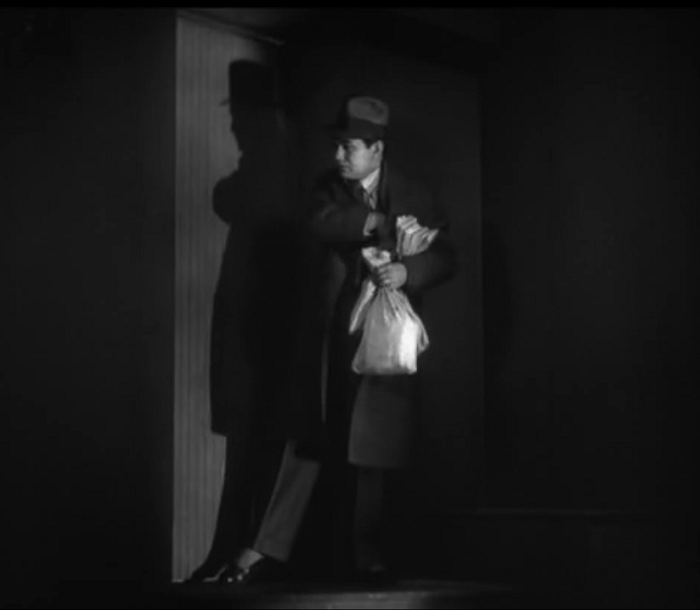

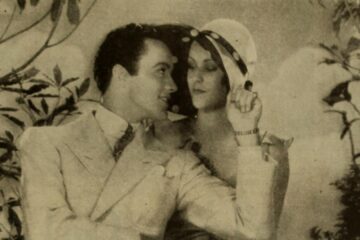


3 Comments
lastseenopshoppingCameron Craven · January 8, 2021 at 1:39 pm
I would argue that rather than being passive, Sams gang just use murder as a last resort. They are not afraid to kill, but they prefer to use the mob tools of intimidation, bribery, and blackmail. On another note, there’s the scene where Rico and Otero are on a bed. Rico touches his collar in a way that reminded me of a scene in the Cohen Bros ‘The man who wasn’t there.” Creighton Tolliver (Jon Polito) touches his collar and Ed Crane (Billy Bob Thornton) says “Is that a pass?”
Comments are closed.